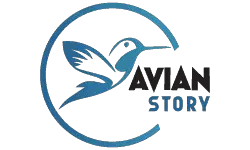Can Cockatiels Eat Cheese? Is Cheese Bad or Good?
Owning a cockatiel pet is fun as they are social and friendly. However, knowing what to feed and not to feed cockatiels is challenging as they are susceptible to various types of food. Some pet owners feed them fruits and vegetables as they wonder, can cockatiels eat cheese?
So, can cockatiels eat cheese? Yes. Cockatiels can feed on cheese. Cheese is not toxic to cockatiels, but too much of it would be harmful to your pet. Lactose contained in cheese is hard to digest. Therefore, it should be fed as a treat in small amounts and supplemented with fruits and vegetables.
This article discusses the various types of cheese you can feed your cockatiels and the health benefits of feeding cheese to your pet.
Is Cheese Bad/Good For Cockatiels
The answer depends on what type of cheese you feed your cockatiels with. Generally, cheese is suitable for your pet if safe and fed in the right amounts. Some cheeses are safe for cockatiels, but if fed regularly in large amounts, they may be harmful.
Birds and cockatiels have little or no digestive enzymes to break down the lactose found in cheese. Therefore, they take longer to digest the lactose.
Other types of cheese like Mozzarella and String have a soft and gummy texture that clogs in the pet’s intestines, causing death and digestion problems.
Swiss, Parmesan, and Cheddar cheese are suitable for cockatiels. However, they should be fed as snacks or treats to avoid digestion complications.
Can You Safely Feed Cheese to Your Cockatiel
Cheese is a dairy product from milk as an animal product. When consumed in small amounts, they are suitable for cockatiels. Most pet owners fear that cheese might be harmful to their cockatiels. The good news is that cheese is not toxic to humans and birds.

However, cheese can not be considered a full-time meal for the cockatiels. Cheese is high in lactose content. Supplement your pet’s diet with fruits, vegetables, and harmless seeds.
It is worth noting that not all cheese is suitable for your cockatiels. It would be best if you avoided cheese with high lactose levels and cheese with a soft and gummy texture. The gummy textured cheese tends to clog the intestines.
Lactose is almost impossible to digest while consumed fully. It is therefore advisable you feed cheese to your pet in small amounts as a treat. This ensures that the amount consumed is digested without complications.
Some pet owners ask, can cockatiels eat cheddar cheese? Yes. Cheddar cheese is one of the best cheeses to feed cockatiels as it has a low lactose content. Birds can’t digest such lactose.
Safe Cheese For Feeding Cockatiels
As earlier mentioned, not all cheese is suitable for consumption by your cockatiel. Some cheese may be suitable for human consumption but unhealthy for your pet. Below are some safe types of cheese with low lactose and sodium levels you can feed cockatiels.
Cheddar cheese
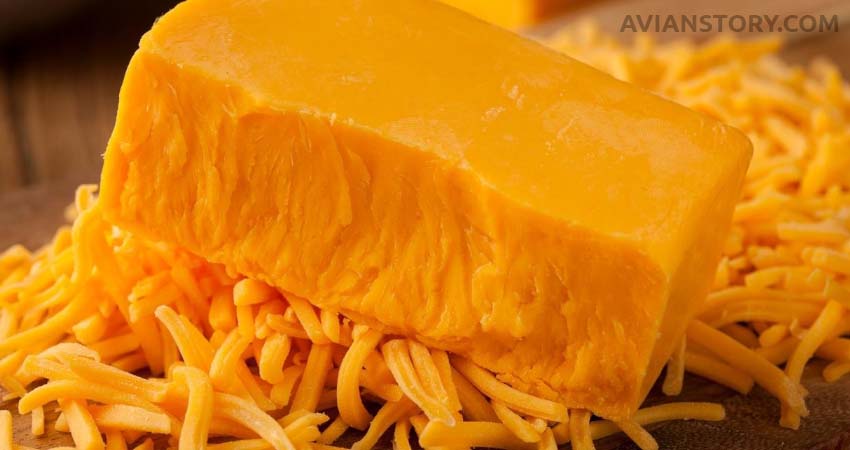
Cheddar cheese is safe for cockatiels consumption but in small portions. The cheese has low lactose levels; hence, the birds can digest it.
However, the sodium levels are too high in cheddar cheese. Therefore, feed it in small amounts and mix it with fruits and vegetables with less sodium. Feed the cheese as a treat in its mild form rather than the normal state.
Parmesan cheese
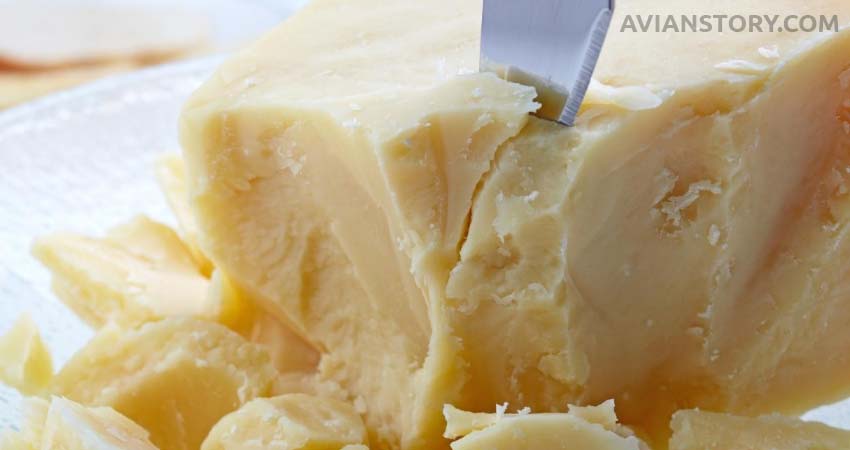
Are you looking for an ideal cheese to feed your cockatiels? Here is one of the best cheese types. Parmesan cheese is low in lactose and hence suitable for your cockatiels.
Cockatiels love eating parmesan cheese. As a pet owner, feed the cockatiels with parmesan cheese once or twice a week. Supplement the cheese with seeds, fruits, and water for better digestion.
Swiss cheese
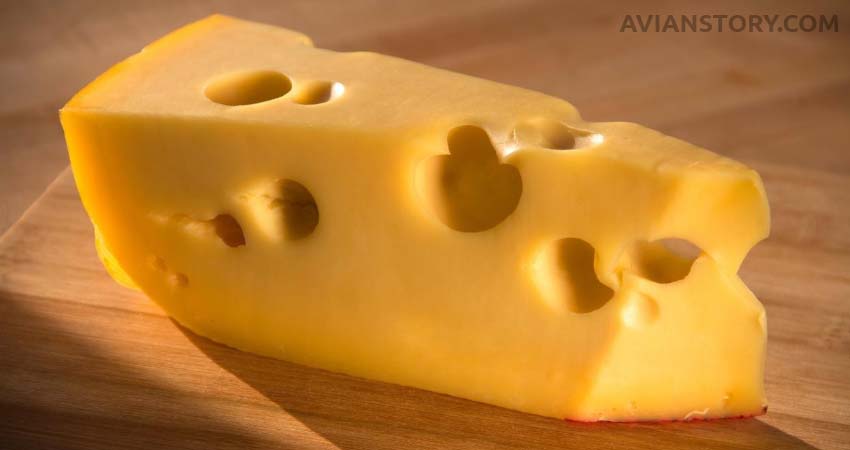
Swiss cheese is another mild cheese to feed you cockatiels.
It has a low lactose level that your pet can easily digest. Another advantage of feeding Swiss cheese is that Swiss cheese has a hard-feeling texture that allows the cockatiels to peck.
Combine the Swiss cheese with vegetables such as kale and pumpkin to improve a balanced diet.
Unsafe Cheese For Feeding Cockatiels
Some cheese contains a high level of lactose and calcium. Others are very soft and sticky. These types of cheese should not be fed to cockatiels as they may threaten their health.
Mozzarella cheese
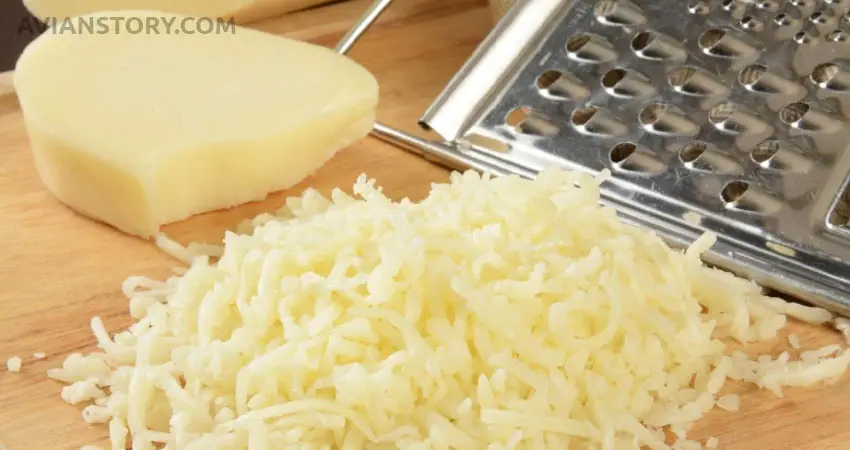
It would be best if you never fed Mozzarella cheese to your cockatiels. The cheese has a low lactose level that is good for the cockatiel’s digestion.
However, Mozzarella cheese has a soft and gummy feeling. The sticky nature of the cheese can cause clogging in the intestines. Clogged intestines can result in sudden death.
If unaware of the type of cheese available in the stores, be specific to avoid this type. It is made from the water buffalo’s milk in Italy.
String cheese
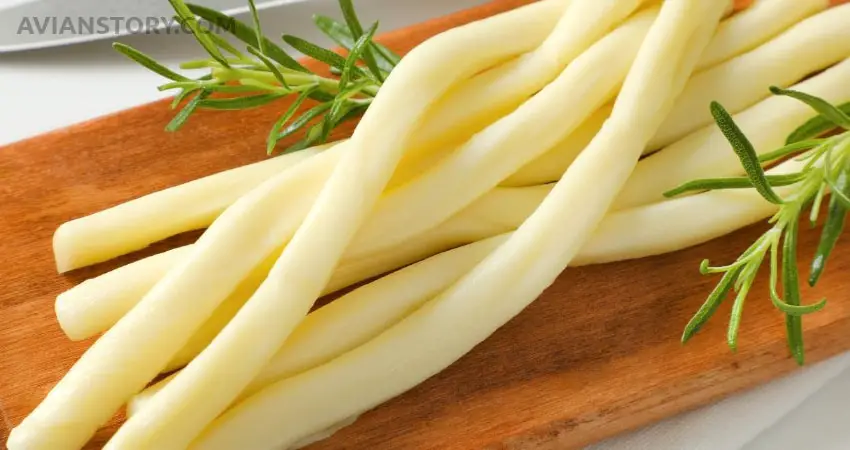
String cheese is made by heating Mozzarella cheese to high degrees. Therefore, they share a lot in common. Avoid feeding it to your pet.
String cheese is good for humans but dangerous to the cockatiels. The string cheese has a very soft and gummy texture. This texture can cause clogging of the intestines, as seen in the mozzarella cheese.
Cottage cheese
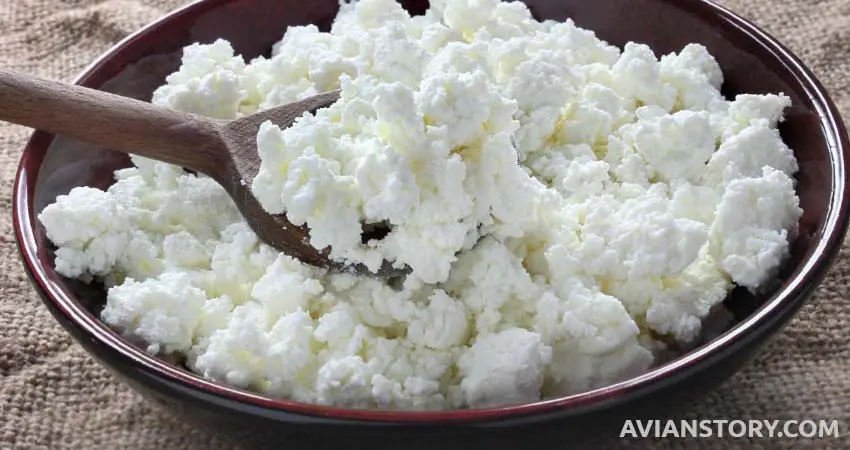
Cottage cheese is made from skimmed milk. It is considered harmful to your pet due to the high lactose and sodium levels.
These types of cheese will have your pet sick, and their chance of recovery is meager. Be keen when feeding your birds to avoid food poisoning.
Can Cockatiels Eat Cheese Puffs
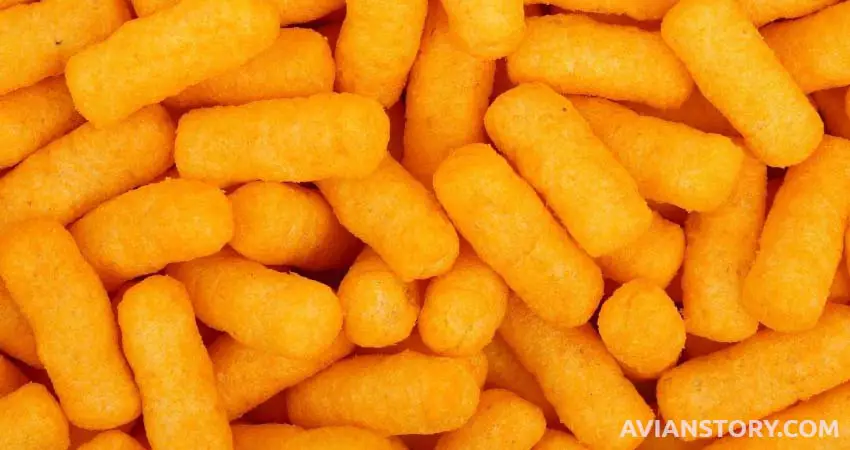
Cockatiels do feed on cheese puffs. However, it is not advisable to feed them to cockatiels as they are mostly considered junk foods.
Cheese puffs are prepared with lots of spices and additives, which are unhealthy for the cockatiels. However, you can feed the cheese puffs in limited portions as a treat to the pet. Preferably once a week, accompanied by lots of fluids to neutralize the salts and spices.
If you want to feed your cockatiels on cheese puffs, you can prepare cheese puffs, especially for the cockatiels. Ensure the puffs are plain with no additives.
Can Cockatiels Eat Cream Cheese
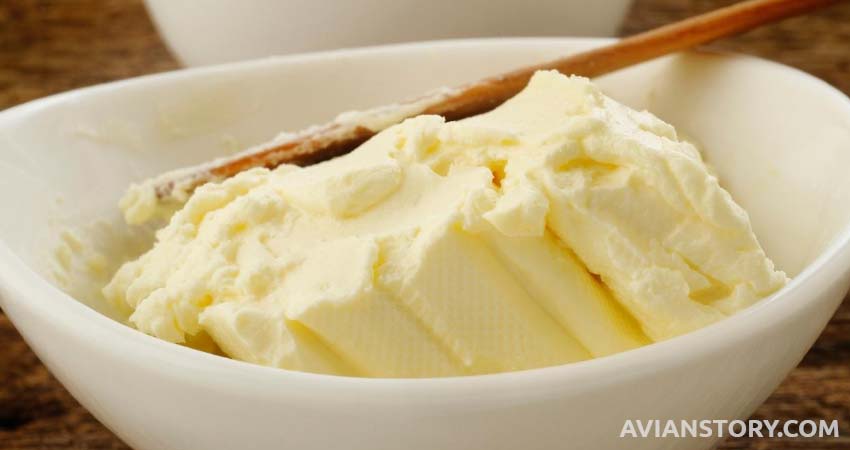
Some of the cockatiel’s keepers wonder, can cockatiels eat cream cheese? Yes. Cream cheese is safe for consumption by cockatiels. Cream cheese is made from skimmed cow milk. The cheese is nutritious and healthy for your pet.
Cockatiels love cream cheese due to its sweet taste and smooth texture.
It is best served with other ingredients, such as rice and berries. Serve the cream cheese moderately to avoid stomach complications.
FAQs
Below are some of the questions asked by the cockatiels owner. They have been answered to satisfy the intentions of the cockatiel’s keeper.
Can cockatiels eat cheese crackers?
Yes. Cockatiels love to eat cheese crackers. Feeding your pet on these crackers is nutritious and highly advisable. Cheese crackers are a combination of various seeds, vegetables, and fruits such as apples that are harmless to the cockatiels. However, avoid using additives, seasoning ingredients, salt, and cooking oil when preparing the crackers. These products may be harmful to your pet.
How often should I feed my cockatiels with cheese?
You can feed the cheese once or twice a week, depending on the amount. The aim is to ensure you don’t overfeed the pet to the extent of suffering from indigestion. To reduce the digestion stress, supplement the cheese with fiber and vegetables. Provide surplus water to their cages for smooth digestion.
Conclusion
Cheese has excellent nutritional value to the cockatiel’s body. The fat and cholesterol are essential but need to be administered in a regulated amount.
Too much cheese harms the cockatiels as they have a low number of enzymes to digest the lactose in cheese. Lactose is suitable for human consumption but harmful to the cockatiels’ digestion system.
Some cheese has a high sodium level and should be avoided at all costs. Feed your pet with cheese that has low sodium and lactose levels. These include Swiss, Parmesan, and Cheddar. To achieve a balanced diet, supplement the cheese diet with vegetables and fruits.
